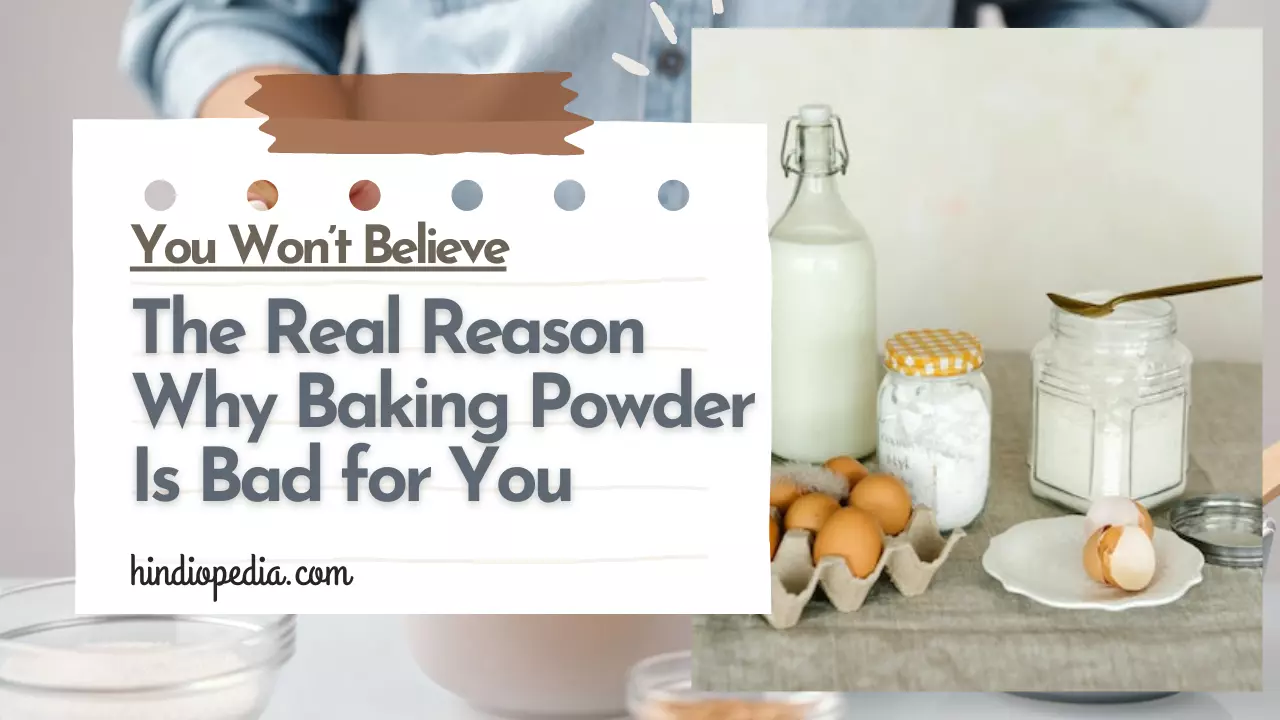Is Baking Powder Bad for You? Benefits, Side Effects & The Nutrition Facts
Baking powder is a common ingredient in many recipes, especially cakes, muffins, and quick bread.
It helps the batter rise and creates a light and fluffy texture.
But have you ever wondered if baking powder is bad for you? What are the health effects of consuming baking powder?
In this blog post, we will explore the nutrition facts, benefits, and risks of baking powder and answer the question: Is baking powder bad for you?
What is Baking Powder?

Baking powder is a type of chemical leavening agent, meaning that it generates gas during the cooking process to raise baked goods.
It is made from sodium bicarbonate (baking soda) and an acid, such as a cream of tartar. It may also contain cornstarch or a similar product to keep it from clumping.
Baking powder requires only moisture for the chemical reaction to occur. Most of the baking powder sold in stores is called “double-acting“, indicating a two-step process. The first reaction happens when the baking powder is dissolved in liquid to create a batter.
The second reaction occurs during the heating process. Both reactions contribute to a light and flexible baked good.
Is Baking Powder Bad for You?
The answer to this question depends on how much and how often you consume baking powder.
In small amounts, baking powder is not bad for you and may even have some benefits.
However, in large amounts, baking powder can cause serious health problems and even death.
Therefore, it is important to use baking powder sparingly and only as directed in recipes.
If you have any medical conditions or allergies that may affect your tolerance to baking powder, consult your doctor before using it.
Also, read Is Meat Tenderizer Bad For You? The pros and cons of Meat Tenderizers for your diet.
Baking Powder Nutrition Facts
According to the USDA, one teaspoon (4.6g) of double-acting baking powder has the following nutrition facts:
| Nutrient | Amount | % Daily Value |
|---|---|---|
| Calories | 2.4 | 0% |
| Fat | 0g | 0% |
| Sodium | 363mg | 16% |
| Carbs | 1.1g | 0% |
| Fiber | 0g | 0% |
| Sugars | 0g | 0% |
| Protein | 0g | 0% |
| Calcium | 339mg | 33% |
| Phosphorus | 456mg | 60% |
As you can see, baking powder has very few calories and no fat, sugar, or protein. However, it does have a high amount of sodium, which can contribute to high blood pressure and other health problems if consumed in excess.
Baking powder also contains some vitamins and minerals, such as calcium and phosphorus, which play a role in maintaining healthy bones, nails, and teeth.
What are the Benefits of Baking Powder?
There is no research on the benefits of baking powder specifically, but there are some potential advantages associated with baking soda, which is an ingredient in baking powder.
Baking soda has an alkaline nature, which means that it can neutralize acids in the body and the environment.
Some of the possible benefits of baking soda are:
#1 Improving kidney function
Sodium bicarbonate has been studied for its role in preserving kidney function in those with chronic kidney disease.
A pilot study of 194 people with chronic kidney disease observed the effects of giving two supplemental doses of sodium bicarbonate over 28 weeks.
The results showed a decrease in urinary ammonium excretion, a marker of kidney disease.
The study authors conclude that exploring the effects of sodium bicarbonate on chronic kidney disease warrants further research.
#2 Promoting oral health
Due to its alkaline nature, sodium bicarbonate has multiple uses in dentistry.
Because it neutralizes acid in the mouth, it can help prevent cavities and dental erosion on enamel surfaces.
It can also act as a potent denture cleanser and may even prevent bad breath.
#3 Relieving heartburn and indigestion
Sodium bicarbonate can act as an antacid, meaning that it can neutralize stomach acid and relieve symptoms of heartburn and indigestion.
However, this should be done with caution and under medical supervision, as too much sodium bicarbonate can cause side effects such as gas, bloating, and alkalosis (a condition where the blood becomes too alkaline).
What are the Drawbacks of Baking Powder?
The amount of baking powder used in cooking or baking is considered safe.
However, serious complications can arise from overdosing on baking powder or having an allergic reaction to it.
Some of the risks of baking powder are:
#1 Overdose
Consuming too much baking powder can cause symptoms such as thirst, abdominal pain, nausea, severe vomiting, and diarrhea.
This can lead to dehydration, electrolyte imbalance, and alkalosis. In severe cases, baking powder overdose can cause seizures, coma, and death.
If you suspect that you or someone else has overdosed on baking powder, seek medical help right away.
#2 Allergy
Some people may be allergic to baking powder or one of its ingredients, such as cornstarch or cream of tartar.
Symptoms of an allergic reaction may include hives, itching, swelling, difficulty breathing, and anaphylaxis.
If you experience any of these symptoms after consuming baking powder, seek medical help right away.
Is Baking Powder Bad for Weight Loss?
Weight loss is a common concern for many individuals, and some wonder if baking powder hinders their efforts.
The truth is that baking powder itself is low in calories and does not directly contribute to weight gain.
However, baked goods made with baking powder may be high in calories, added sugars, and unhealthy fats.
So, it’s important to consider portion sizes and the overall nutritional content of the foods prepared using baking powder.
Is Baking Powder Bad for Your Stomach?
Baking powder can be bad for your stomach if you consume too much of it or have certain medical conditions.
It can cause poisoning, ruptured stomach, toxicity in children, and interference with medications.
Side Effects of Baking Powder
While baking powder is generally safe for consumption in moderate amounts, there are some potential side effects to be aware of, particularly if consumed in excess.
These include:
Is Baking Powder Bad for Your Heart?
Baking powder is not inherently bad for your heart. However, some commercial baking powders contain added sodium, which can contribute to high blood pressure and other cardiovascular issues if consumed in excess.
If you have a history of heart problems or are on a low-sodium diet, it’s advisable to choose low-sodium or sodium-free baking powder options or consider alternative leavening agents like yeast or whipped egg whites.
Is Baking Powder Bad for Your Skin?
Baking powder is not typically harmful to the skin.
In fact, some people use it as a natural exfoliant or ingredient in homemade skincare remedies.
However, individual skin sensitivities may vary, and excessive use of baking powder on the skin could lead to dryness or irritation.
It’s always recommended to perform a patch test and consult with a dermatologist before incorporating any new skincare ingredients.
Is Baking Powder Bad for Your Teeth?
Baking powder is a mixture of baking soda and other ingredients, such as cream of tartar and cornstarch.
Baking soda is a common ingredient in toothpaste and has been shown to have whitening, antibacterial, and plaque-reducing effects on teeth.
However, apart from baking soda, baking powder may also contain other substances that are not beneficial for your teeth such as salt, acid, or starch.
These substances may cause tooth erosion, sensitivity, or cavities if used too frequently or in high concentrations.
Therefore, it is not recommended to use baking powder as a substitute for toothpaste or as a whitening agent.
Summary
Baking powder, when used in moderation and as part of a balanced diet, is generally safe for consumption. It does not pose significant health risks for most individuals.
However, it’s important to consider the overall nutritional content of baked goods made with baking powder and to be mindful of any specific dietary restrictions or sensitivities.
As with any ingredient, moderation is key. If you have any concerns or specific health conditions, it’s always best to consult with a healthcare professional.
The Bottom Line
I hope this blog post was helpful and informative for you and it helped you learn whether Baking Powder is bad for you.
If you have any experience with Baking Powder, feel free to share your experience in the comments below.
We would love to hear from you.
Thank you for reading and have a great day!






